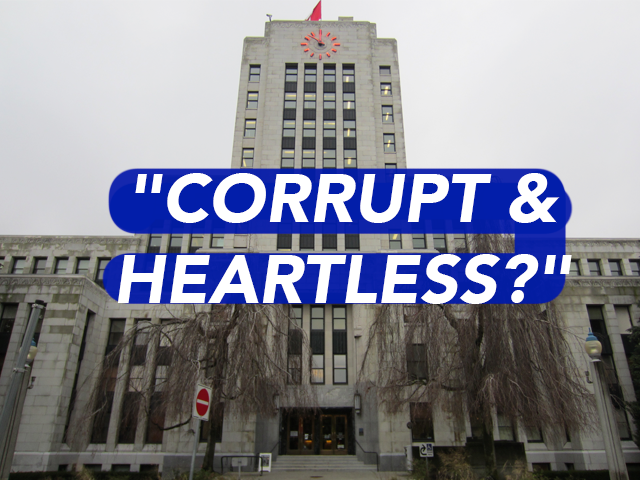
Vancouver Council’s Cruel Priorities: Developers Before the Poor

Vancouver has long been at the epicenter of Canada’s housing crisis. Skyrocketing rents, record homelessness, and a dwindling supply of truly affordable homes have left thousands of residents struggling for survival. Against this backdrop, on Sept 4th 2025 the Vancouver Sun recently reported that City Council is accelerating the demolition of affordable low-rise rental apartments along the Broadway and Cambie corridors.
According to former Chief Planner Brent Toderian, this policy is being described by urban planners across the region as a deliberate effort to help developers facing “hard times” during the housing market slowdown.
Let that sink in. While thousands of Vancouverites endure the daily trauma of eviction notices, unsafe shelters, or life on the street, City Hall’s concern is with developers’ bottom lines.
The Loss of Low-Rise Rentals
For decades, Vancouver’s older low-rise apartment blocks have served as the backbone of affordability in the city. These walk-up buildings, though not glamorous, offered accessible homes for seniors, immigrants, students, and the working poor. They created communities of belonging in neighborhoods that were walkable, human-scaled, and connected to transit.
Today, these very buildings are being targeted for demolition. Council is clearing the way for high-rise towers, marketed as “density solutions,” but in practice built and priced for middle- and upper-income buyers. For every affordable unit torn down, what replaces it is out of reach for the people most in need.
Demolition is not neutral. It displaces long-term tenants, many of whom cannot find another home in the city. It destroys affordability that took generations to establish. And it erodes the very neighborhoods that made Vancouver livable for ordinary families.
Who Benefits, Who Suffers
The winners here are clear: large-scale developers, many of whom have close ties to Council and enjoy favourable rezonings, subsidies, or regulatory leniency. These companies frame high-rise construction as a way to “increase supply” — yet the supply they produce does little for those already priced out.
The losers? Ordinary Vancouverites. The working-class renter, the fixed-income pensioner, the new immigrant family — these are the people forced into overcrowded units, pushed further out of the city, or driven into homelessness.
And make no mistake: homelessness is not an abstract concept. It is tents under the SkyTrain. It is families couch-surfing night after night. It is the elderly man sleeping in a shelter after being “renovicted” from his one-bedroom.
The Moral Failure of Council
City Council’s message could not be clearer: profit margins for millionaires matter more than roofs over heads for the poor.
It is deeply cynical to claim that demolitions and high-rises are the answer to affordability. If housing policy is reduced to serving developers in a slowdown, then the very notion of housing as a human right has been abandoned.
At a time when the gap between rich and poor is widening, when encampments are growing, and when the public demands justice, Council has chosen to side with the wealthy few. This is not leadership. It is complicity in deepening inequality.
What is even more chilling is what Jean Swanson said, she is a past member of Vancouver City Council. Jean Swanson is considered an “unhoused advocate” : The broadway plan and cambie corridor there is virtually no low income housing. Affordability is just 20% below market so no one on disability, senior pension or welfare or min wage would have a hope of affording even the “affordable” units.
A Call for Justice
Vancouver must choose differently.
-
Protect existing affordable rentals. The first rule of affordability should be to stop destroying the homes that are already affordable.
-
Prioritize people, not profits. Housing policy must serve tenants, low-income families, and the unhoused before it serves investors and developers.
-
Reinvest in social and supportive housing. True affordability comes from public commitment, not market speculation.
-
Hold Council accountable. Citizens must demand transparency and resist policies that put private profit ahead of public need.
Conclusion
The contrast could not be sharper. On one side are developers facing “hard times” because their profits have slowed. On the other side are human beings facing true hard times — eviction, displacement, homelessness, and despair.
Vancouver City Council has chosen its side. It is time for residents, advocates, and voters to choose ours.
Housing is not a commodity. It is a human right. And no council that trivializes the suffering of the poor in favour of corporate interests should be allowed to pretend otherwise.

For your convenience, here are their direct e-mail addresses.
Ken.Sim@vancouver.ca
CLRbligh@vancouver.ca
CLRdominato@vancouver.ca
CLRfry@vancouver.ca
CLRkirby-yung@vancouver.ca
CLRklassen@vancouver.ca
CLRmeiszner@vancouver.ca
CLRmontague@vancouver.ca
CLRzhou@vancouver.ca
sean.orr@vancouver.ca
lucy.maloney@vancouver.ca
Or here they are in one list:
Ken.Sim@vancouver.ca, CLRbligh@vancouver.ca, CLRdominato@vancouver.ca, CLRfry@vancouver.ca, CLRkirby-yung@vancouver.ca, CLRklassen@vancouver.ca, CLRmeiszner@vancouver.ca, CLRmontague@vancouver.ca, CLRzhou@vancouver.ca, sean.orr@vancouver.ca, lucy.maloney@vancouver.ca
Here again is an online form to send message to Mayor and Council:
http://vancouver.ca/your-government/contact-council.aspx
Here are their Twitter handles:
@KenSimCity
@rebeccaleebligh
@PeterMeiszner
@LennyNanZhou
@PtFry
@LisaDominato
@BrianVMontague
@sarahkirby_yung
@MikeKlassen
@seanorr
@Lucyincanada
Former members: @christineeboyle, @AdrianeCarr
